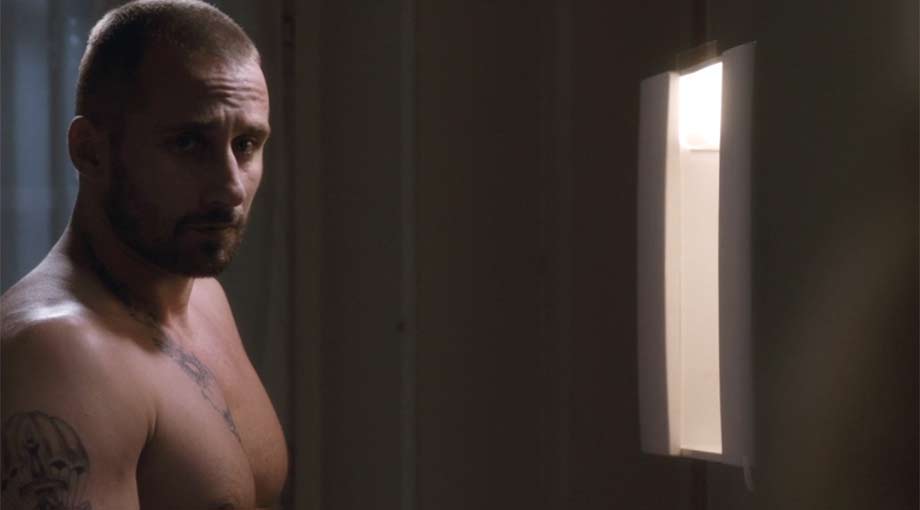Interview: Alice Winocour on Disorder, PTSD, and Joining the Academy
 Sunday, August 21, 2016 at 4:34PM
Sunday, August 21, 2016 at 4:34PM by Nathaniel R
 Alice Winocour, writer/director of "Disorder"The absence of strong female representation behind the camera has been a constant sore subject this past year in the world of cinema. But there are shining exceptions to the rule. Though Alice Winocour began making shorts a dozen years ago and released her first feature in 2013, the 40 year old French director really broke through with the one-two punch of Mustang (which she co-wrote) and Disorder (which she co-wrote and directed) last summer at Cannes. Mustang went on to an Oscar nomination for Best Foreign Language Film (and much love - including right here). After serving on the Cannes International Critics Week jury this summer (one year after her own breakthrough double) she's making the rounds promoting Disorder which has finally hit US screens after its festival run.
Alice Winocour, writer/director of "Disorder"The absence of strong female representation behind the camera has been a constant sore subject this past year in the world of cinema. But there are shining exceptions to the rule. Though Alice Winocour began making shorts a dozen years ago and released her first feature in 2013, the 40 year old French director really broke through with the one-two punch of Mustang (which she co-wrote) and Disorder (which she co-wrote and directed) last summer at Cannes. Mustang went on to an Oscar nomination for Best Foreign Language Film (and much love - including right here). After serving on the Cannes International Critics Week jury this summer (one year after her own breakthrough double) she's making the rounds promoting Disorder which has finally hit US screens after its festival run.
I had the pleasure of seeing both films nearly back to back at AFI last November and I was stunned that the same person was involved with both. She admits that "it was funny to switch from one film to the other" during their festival runs. They really couldn't be more different, one a memoirish feminist drama and the other a tightly wound home invasion thriller. I had the pleasure of sitting down with her in Manhattan this month to talk about her big year.
NATHANIEL: Since you've written a few features was Disorder a conscious choice to show your directorial chops? Thrillers are not generally thought of as writer's pictures.

ALICE WINOCOUR: Writing is an unconscious process. You don't think about it like that. You just fall in love with the subject or character and then you start to tell the story...
That's what happened with Disorder. I heard that soldiers were coming back from Afghanistan and I felt I had to meet them. I went to the hospital and I interviewed them and I wasn't fascinated by their stories. I imagined the character of Vincent facing a world of corrupt politicans and arm dealers. So it's more about fascination [with a subject].
NATHANIEL: And that was different from writing Mustang in what way?
ALICE WINOCOUR: Mustang was more about my friendship with Denis [the director]. We both went to the same cinema school in France. We met at Cannes and we were trying to find money for our films. She told me the story about her childhood and the innocent games in the sea at the beginning of the film. I thought it would be a great story. I was raised with four cousins so I could relate to it.
But it's a very different process when you write for yourself. I feel more like a director than a writer. I studied scriptwriting in school but I couldn't write for someone I didn't feel connected to.
Interesting. A lot of what is really good about Disorder is the mood. There's such great sound and editing. Film is so collaborative. Did you know your team before?
I worked with a lot of the same people as my first film Augustine. It was a different kind of film, a period film, but it was also a strange love story with a dark romanticism. I had the same DP and the same editor. I like to work with the same people but every story is different.
Winocour's first films was about a famous neurologist and his teenage patient.
Since your first two features are different genres, do you plan to keep mixing it up in that way?
My third film is about a woman astronaut so it's a different subject but there are connections between the three films. They're all about dysfunctional and traumatized bodies. When there are no words to express your pain or your desire, than it's the body that is talking. To me it opens up a world of cinema. You can do a physical and sensorial film. Disorder is a sensory experience.
It helps to have such expressive actors!
...and very physical actors.
Diane and Matthias are both so good in this but a lot of what they're doing is unspoken. So do you rehearse blocking a lot in situations like that where it's not dialogue based?
I didn't do any rehearsal. We worked a lot on Matthias body with his scars and tattoos. It's something I had seen on real soldiers. Matthias had to carry the story on his body. I had him meet the soldiers and we continued to work with them.
 Vincent (Schoenaerts) is hired to protect Jessie (Diane Kruger) in "Disorder"
Vincent (Schoenaerts) is hired to protect Jessie (Diane Kruger) in "Disorder"
What about Diane? When the film starts she's very backgrounded but she comes more into focus.
To me she was this trophy wife but at the same time she's very emotional. Diane has both sides [the physical and the emotional - Editor] so she could follow the character's emancipation. She liberates herself, even if it's really the backstory since we see everything from Vincent's POV.
That's what makes this so unique, Vincent's headspace.
You never know if what you see is real or if it's an effect of his paranoia. Even the love story could be some kind of dream. You could imagine that it's a fantasy of his. It's a singular POV; a bodyguard can only see through the window or a door that's open. You have to, as he does, imagine what's going on. I tried to play with the rules. For example when the dog goes missing -- in a more classical way of telling stories, you'd find him dead in the garden. But now you just see that he's disappeared. So you start to telling yourself stories like Vincent does.
You wanted it to be very open? Thrillers by their nature are tightly constructed but your mind can wander in this film which is a unique thing about it.
To me it was really something I wanted to express about contemporary life with this constant flow of information. You have this feeling of seeing everything and at the same time not understanding anything of what's going on. I think we are all tense around the world, in this hyper-vigilant state, this constant paranoia. That's really a soldier's state of mind. They have to react to threats.
When I met all these elite soldiers they told me that their way of behaving seems like madness to us in a calm and peaceful world. But when you're in a combat zone that's a way of survival. You shouldn't sit next to a window. There are plenty of things you do to protect yourself. It seems so far away but now that we live in a world where a threat is all around us, we're all in Vincent's state of mind.

Did you ever show it to soldiers?
Of course. When I did the UK release I had a very interesting interview. We were sitting and at the end of the interview I noticed he had no leg. He was a former soldier who became a journalist. He was really moved by the film.
A lot of soldiers helped me. Soldiers are not very talkative because they don't know how to express themselves. PTSD is not something you can express in words. With this one soldier I became very close to, it was almost like therapy. We were talking about Vincent, an imaginary character, but he was really talking about himself, so he felt protected. He was there in the shooting and helped me with the action scenes, and he met Matthias too.
You've had quite a year between Disorder and Mustang. I heard you joined the Academy. Congratulations!
Thank you.
Do you regularly watch the Oscars?
Of course I watch the Oscars. But more the results of it because it's very late for French people! I was really honored. It was a very cool surprise. I'm excited to be able to see all the films. I've been to Cannes with my films but in years when I was not there for a reason, I still went to see all the films. The state of the World Cinema -- as a filmmaker you should know all the voices. It's like an update!
Totally.
I look forward to seeing all the Oscar movies. I'm really curious and I have a feeling it's going to be very inspiring.
 At the premiere of Disorder at Cannes last summer
At the premiere of Disorder at Cannes last summer

Disorder is now playing in limited release. You can read our review here.



Reader Comments (6)
I love that Mustang was a collaboration between two friends. I mean, of course it was!
And I personally want to thank Ms. Winocur for adding to the gallery of strong, beautiful Schoenaerts performances.
Oh Matthias SWOON
Just saw Disorder - very good thriller. Liked it alot.
Great interview, loved Mustang and looking forward to Disorder,
She seems cool. And charismatic. And based on Mustang (one of the more perfect screenplays in recent years), also crazy talented.
Will seek out Disorder now!
Great interview. I'm so excited about this filmmaker and I can't wait to see what she does next.